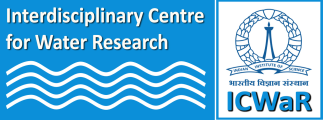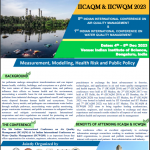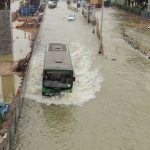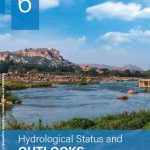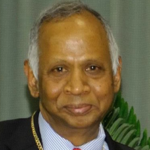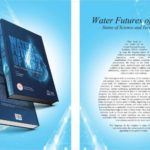Desalination – Technical challenges and Road Ahead
Name of the Speaker: Dr.Purnima Jalihal
Title of the Seminar: Desalination – Technical challenges and Road Ahead
Date and Time: 29th May, 2019 (Thursday), 4:00 PM
Venue: Lecture Hall, ICWaR
About the speaker: Dr. Purnima Jalihal is a senior scientist who heads the Energy and Fresh Water group in the National Institute of Ocean Technology, India. She has coordinated many first – ever projects in ocean energy and desalination. She has jointly coordinated the world’s first ever ocean thermal gradient based desalination plant at Kavaratti island in the Lakshadweep group in the Arabian Sea which has helped transform the lives of the small island community which had a serious lack of drinking water. For this work she was awarded the Vishwakarma Medal in 2006 by the Indian National Science Academy. This success led to more plants in islands and a demonstration plant offshore. Dr. Purnima is now attempting to scale up the technology and power such plants using ocean renewable energies. She has several firsts in the area of ocean energy as well, including a wave powered desalination system at Kerala, a wave powered navigational buoy and a hydrokinetic turbine. Her areas of specialization include offshore structures, floating and structural dynamics, renewable ocean energies and desalination.She has MS and PhD degrees in Civil Engineering from Duke University , USA. She is currently working on a large scale desalination project at Tuticorin thermal power station using the condenser reject heat and a self powered thermal desalination at Lakshadweep using the power generated from the temperature gradient. Additionally, she played a pivotal role is getting Cabinet’s approval for India to become Member Country of the International Energy Agency’s Ocean Energy Systems (IEA-OES) Technology Collaboration Program (TCP) with the NIOT as the participating agency in 2016 and held the first Ex Co meeting in India in November 2017.
Abstract: The current scenario where water stress dominates most of the regions in India warrants new technological solutions for fresh water generation. Desalination has been on the horizon for some decades now due to large plants in the Gulf. There are several types of desalination methods predominantly thermal and membrane based. The technical challenges include proper methods for intake and discharge of seawater, optimization of thermodynamic parameters for thermal systems, chemicals and bye products for membrane methods and energy requirement optimization. The location, water quality and environmental impact and other parameters like availability of steam all need to be considered for appropriate selection of the desalination method. Desalination of brackish water as well as seawater promises to be a good solution to the water crisis. Desalination methods are energy intensive and towards lower carbon footprint, use of renewable energy forms need further exploration and development. Cost and energy reduction for thermal technologies and safe disposal of by products for membrane methods is the need of the hour.
Date/Time
Date(s) - 29/05/2019
4:00 pm
